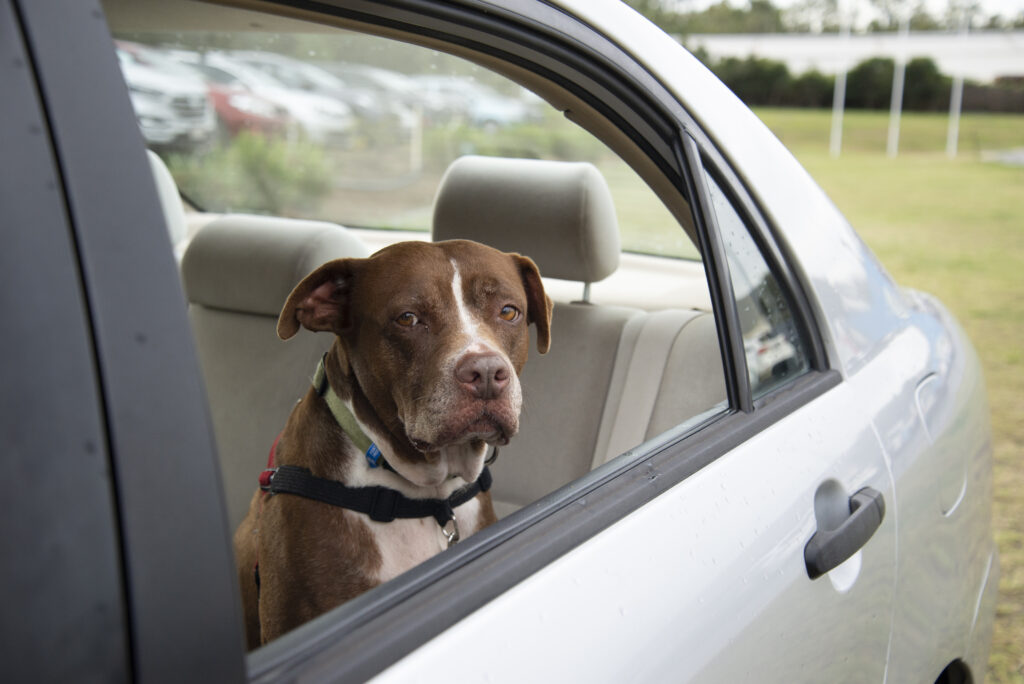As temperatures hovered in the mid-30s last weekend, RSPCA South Australia inspectors were called to three incidents where dogs had been left inside cars. In one incident at 3.30pm on Sunday, a border collie was reported as panting on the front seat of a black Mazda, with a window partially down but no visible water. The vehicle was parked in full sun at the Harbor Town car-park off Tapleys Hill Road. The outside temperature at the time was 32C.
Reports of animals left in vehicles have dropped significantly over the last five years, from 308 in 2018 to 161 in the last financial year. But RSPCA South Australia's Chief Inspector Andrea Lewis said there is no room for complacency, with last weekend's reports cause for alarm.
"With temperatures over 30 degrees, no animal should have been left inside any vehicle last weekend for any length of time, and same goes for tomorrow with a forecast of 32," Inspector Lewis said.
"Unless you are taking your dog with you when you leave the vehicle, we urge people to keep their pets safe at home."
In around 80% of reports over the last 12 months, the dogs had been left inside vehicles at shopping centre carparks. RSPCA SA has also heard of tragic incidents where people have returned home and forgotten they had their dog in the car, only to discover the animal deceased hours later.
"It is extremely concerning to us that no matter how much we raise the alarm about this, some people still seem to think it is OK to take their dog with them even though they know they will be leaving the dog unattended inside the car at some stage," Inspector Lewis said.
"Even on mild days with the temperature in the low-20s and windows partially down, animals left in cars are at risk because the air heats quickly inside a vehicle.
"For dogs that are long-coated, elderly, overweight or with compromised respiratory systems due to their physiology, such as bulldogs, boxers and pugs, the risks are especially high.
"The bottom line is that a car is not the place to leave any animal - it is for transporting only.
"Just as you should never leave a young child alone in the vehicle, you should also never leave your dog."Dogs can and have died in as little as six minutes after being left inside a car, or they have suffered serious and permanent harm from heat stress or heat-stroke - it is never worth the risk."
Dogs transported on the back of utes also suffer in hot weather as ute trays become hotplates and burn paws and skin. RSPCA advises against transporting dogs on the back of utes, not only because of exposure to weather but also the risk of injury.
What to do if you have concerns for an animal locked inside a vehicle:
- Call RSPCA on 24/7 Cruelty Report Hotline - 1300 477 722. NOTE – Due to resourcing (especially on weekends), an RSPCA inspector may not be able to attend within a short time-frame. If no attendance, call police on 0000.
- Write down car's make, model and license plate number. If you have a mobile, take a photo of the vehicle and the dog.
- If car is parked in a carpark, have the owner paged at nearby places (ie: shops, gyms, cafes/restaurants, pubs)
- If car is parked in a residential street, door-knock nearby houses to locate owner.
- If the dog's condition is deteriorating and the animal is showing symptoms of heatstroke (heavy panting, vomiting or unconscious), find a witness who will confirm your assessment and do what you have to do to get the animal out and into shade. Provide water.
- Leave a note for the owner on the car, and take the dog to the nearest vet.
- Do not leave a dog in a hot car until you see that they are safe.
RSPCA recommends some simple things dog owners can do to protect their dogs this summer:
- Never leave your dog in a car. Temperatures can rise quickly, even in the shade with windows down. Dogs can die in as little as six minutes in a hot car.
- On hot days, walk your dog very early in the morning or late in the evening when it is cool.
- Don't walk on hot surfaces such as sand or concrete. If you can't hold the back of your hand to the surface for more than a few seconds, it's too hot for your dog's paws.
- Always make sure your dog has access to clean, fresh water in multiple untippable containers and a shaded area with good ventilation or an air-conditioned indoor space.







